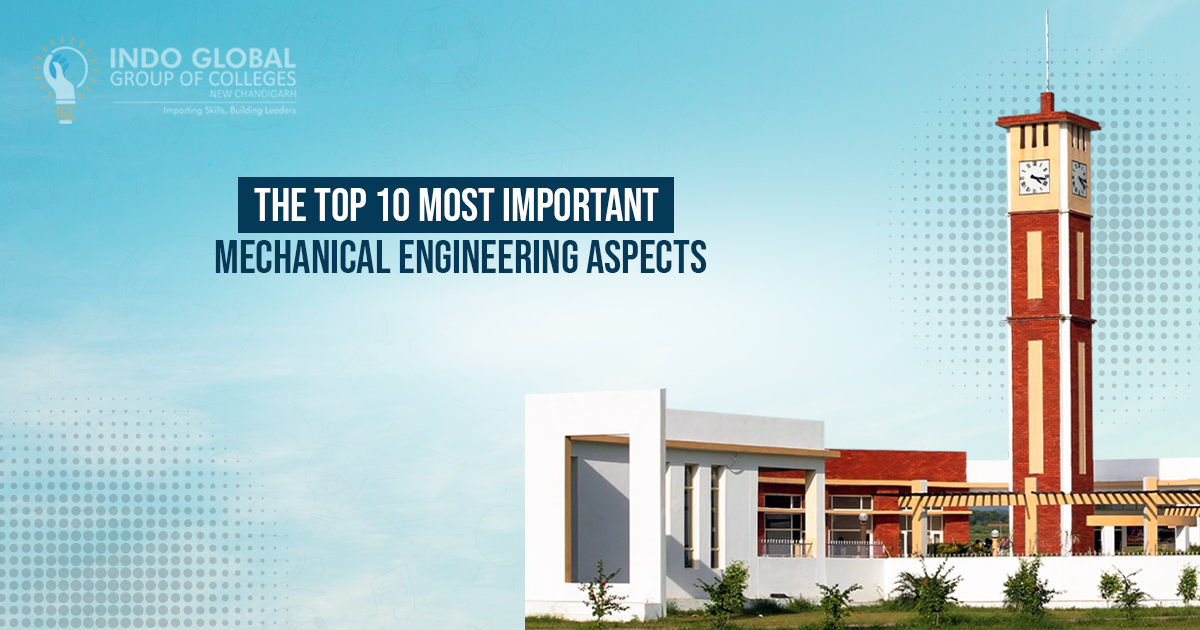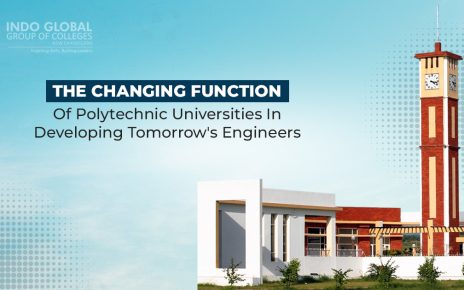Mechanical engineering, often hailed as the backbone of the engineering world, encompasses a multitude of disciplines crucial for innovation and progress. From designing complex machinery to optimizing energy systems, mechanical engineers play a pivotal role in shaping the world we live in. In this comprehensive guide, we delve into the top 10 most important aspects of mechanical engineering, shedding light on their significance, applications, and impact on various industries. Additionally, we explore the landscape of mechanical engineering education, focusing on the best engineering colleges in Punjab and Chandigarh, renowned for their academic excellence and contributions to the field.
- Mechanical Design and Analysis:
Mechanical design forms the cornerstone of engineering innovation, encompassing the conceptualization, prototyping, and optimization of mechanical systems and components. Engineers utilize advanced CAD (Computer-Aided Design) software to model intricate structures, ensuring efficiency, durability, and safety. Through finite element analysis (FEA) and computational fluid dynamics (CFD), they simulate real-world conditions, identifying potential flaws and optimizing designs for peak performance.
- Thermodynamics and Heat Transfer:
Thermodynamics and heat transfer play a vital role in various engineering applications, including energy systems, HVAC (Heating, Ventilation, and Air Conditioning), and automotive engineering. Understanding thermodynamic principles enables engineers to design efficient power plants, refrigeration systems, and combustion engines. Moreover, expertise in heat transfer facilitates the development of advanced cooling solutions, thermal management systems, and renewable energy technologies.
- Fluid Mechanics and Aerodynamics:
Fluid mechanics and aerodynamics are fundamental to the design and operation of vehicles, aircraft, and fluid power systems. Engineers analyze the behavior of fluids—liquids and gases—under different conditions, optimizing performance and minimizing energy losses. By studying aerodynamic principles, they enhance the efficiency and stability of aircraft, streamline vehicle designs, and improve the performance of turbomachinery, such as pumps and turbines.
- Materials Science and Engineering:
Materials science lies at the intersection of physics, chemistry, and engineering, focusing on the properties, structure, and behavior of materials. Mechanical engineers leverage this knowledge to select appropriate materials for specific applications, considering factors such as strength, durability, and corrosion resistance. Advanced materials, including composites, alloys, and nanomaterials, enable the development of lightweight structures, high-performance components, and advanced manufacturing processes.
- Manufacturing Processes and Automation:
Manufacturing processes encompass a diverse range of techniques used to convert raw materials into finished products efficiently and economically. Mechanical engineers play a key role in optimizing manufacturing processes, implementing automation, robotics, and advanced machining technologies to enhance productivity and quality. From additive manufacturing (3D printing) to CNC (Computer Numerical Control) machining, innovation in manufacturing drives advancements across industries, from aerospace to healthcare.
- Robotics and Control Systems:
Robotics and control systems combine elements of mechanical engineering, electrical engineering, and computer science to create intelligent systems capable of autonomous operation. Mechanical engineers design robots for diverse applications, including industrial automation, medical robotics, and space exploration. Control systems engineering enables precise regulation of machinery and processes, enhancing efficiency, safety, and reliability in complex systems.
- Mechatronics and IoT (Internet of Things):
Mechatronics integrates mechanical systems with electronics and computer control, enabling the development of smart devices and interconnected systems. In the era of IoT, mechanical engineers play a crucial role in designing sensors, actuators, and embedded systems for monitoring and controlling physical processes. Mechatronic systems find applications in automotive electronics, home automation, and industrial IoT, revolutionizing how we interact with technology.
- Renewable Energy and Sustainable Engineering:
Addressing global challenges such as climate change and energy security requires innovative solutions in renewable energy and sustainable engineering. Mechanical engineers lead the development of clean energy technologies, including solar power, wind energy, and biomass conversion. By optimizing energy systems and minimizing environmental impact, they contribute to a more sustainable future, driving the transition towards renewable energy sources.
- Vehicle Dynamics and Transportation Engineering:
Vehicle dynamics and transportation engineering focus on optimizing the performance, safety, and efficiency of vehicles and transportation systems. Mechanical engineers analyze vehicle behavior under different conditions, enhancing handling, stability, and fuel efficiency. Through innovations in automotive design, traffic management, and alternative transportation solutions, they shape the future of mobility, addressing urban congestion and reducing emissions.
- Biomechanics and Biomedical Engineering:
Biomechanics and biomedical engineering apply mechanical principles to understand the mechanics of biological systems and develop medical devices and treatments. Mechanical engineers collaborate with healthcare professionals to design prosthetics, implants, and medical instrumentation, improving the quality of life for patients worldwide. By leveraging advances in materials, robotics, and bioengineering, they pioneer innovations in regenerative medicine, personalized healthcare, and assistive technologies.
Conclusion:
Mechanical engineering encompasses a vast array of disciplines, each playing a critical role in driving innovation and progress across industries. From designing cutting-edge machinery to tackling global challenges in energy and sustainability, mechanical engineers continue to push the boundaries of what is possible. Aspiring engineers seeking to embark on this rewarding journey can benefit from the exceptional education offered by the best engineering colleges in Punjab and Chandigarh, renowned for their academic excellence and commitment to shaping the future of mechanical engineering.



